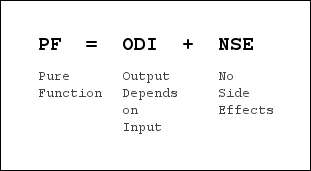Zeroes and Ones
Functional Programming 101. What is a Pure Function?
In the previous posts we have talked about how apps are data that is presented in a consumable and meaningful way, and how data should be kept immutable when possible. Obviously, if we are going to transform the data, we need a way to do it. That way is functions, but not any functions: pure functions.
What is a pure function? besides an apparently pious piece of code, a pure function is a... function that creates and returns a value based only on the input parameters and causes no side effects. It means that inside my function body I shouldn't depend on outside variables that could later change, and that the code causes change outside itself.

A good way to think about it, is to think it as a mathematical function like this: f(x) = x^2 so f is the function name, x is the input and x^2 is the output. So basically we always need to take an input, we always get and output, and if we provide n times the same input (parameters in our case) to the function, we should always get the same result.
As Kyle Simpson explains, in Functional Programming we should embrace using functions as functions in the mathematical sense. This might feel weird at the beginning (I know it was for me) because I used to think of functions as procedures, what is a procedure? Let Kyle drop the knowledge to you:
"A procedure is an arbitrary collection of functionality. It may have inputs, it may not. It may have an output (return value), it may not". Kyle Simpson
Example time? Sure why not
Pure Function:
const mergeArrays = (array1, array2) => [...array1, ...array2]
So simple and beautiful it brings tears to my eyes.
Now, I will unfold for you one super, ultra, impure function I wrote some time ago. Here my public humiliation:
Impure Function
function getRandomQuote(res) {
const times = iteration.value
const arr = res.data.quotes
cleanPrevious()
for (let i = 0; i < times; i++) {
const random = Math.floor(Math.random() * arr.length)
const randomQuote = arr[random]
addElement(randomQuote)
}
}
Where to start? Thank the gods I took an argument, but if you see I don't have any return value, I'm leaving side effects (cleanPrevious() is affecting outside code, addElement() is adding things in the DOM) among other things. This is a perfect example of a function as a procedure as previously defined, I'm just collecting functionality and tying it together under getRandomQuote label.
Now, don't get me wrong. If you are going to do DOM operations, you obviously will affect code outside the function. The idea is to keep that at a minimum and under control.

Learnings
I think is has been great to learn about pure functions while practicing TDD because one obvious thing you can tell is that pure functions are very easy to test. Imagine one test for mergeArrays:
test("merges two arrays into one", () => {
const returnedResult = mergeArrays([1, 2, 3], [4, 5, 6])
const expectedResult = [1, 2, 3, 4, 5, 6]
expect(returnedResult).toEqual(expectedResult)
})
But how about getRandomQuote? First I don't have a returned value, so how do I expect something? I won't even try.
Second lesson: Is much simple and mantainable. Although is not extrictly part of pure function, in Functional Programming (perhaps in programming in general(?)), functions are encouraged to have a single responsability, if you want to do something more complex... use them together. Also, because we should always have a return value, we can use that return value as the expect input for another function and so do function composition, or chain functions (but that is another topic, and its Friday).
Keep code immutable, and functions pure is a hard task for me, but I think is a fruitful pursuit. The benefits are clear, is just a matter of practicing, and have these designing ideas always present.